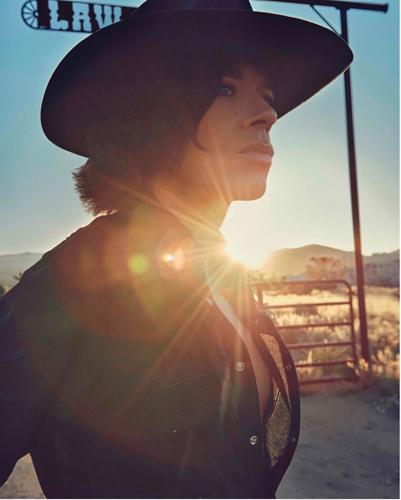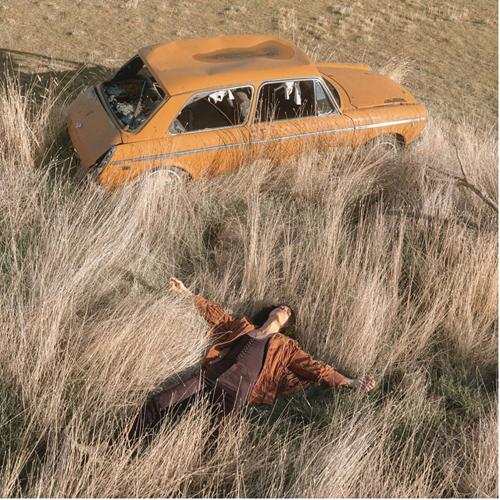
Lawrence Rothman
Lawrence Rothman concludes their triumphant release tour for The Plow That Broke the Plains with Saturday’s show in Nashville, only a few miles from where the album was born. Ever the shapeshifter, Rothman makes music that is not easy to place in one genre, which is just the way they like it. However, when they sat down to write The Plow That Broke the Plains in a cabin outside Franklin, the roots-rock they grew up with flowed from their pen.
“Having just a guitar and a piano in my hand made the songs go a little bit more traditional,” says Rothman. “Once that was happening, I didn’t want to force anything.”
When preparing to record, Rothman typically pulls from batches of songs written over an extended period. But The Plow That Broke the Plains represents a specific snapshot in time, the output of that creative flow amid the Tennessee greenery.
“I feel like when I’m down there, I can think, I can write, I can focus,” they say. “It’s very similar to how I grew up, and I can catch that kid spirit again, which helps me prolong my art. The moment I lose the child in me is the moment I think I’ll probably lose my art.”
Rothman grew up in St. Louis. Their father was a rock DJ on FM radio, but at home he played a wide variety of genres. “It was the pre-internet days,” Rothman recalls, “and he was our portal into the world of music outside of the four walls of St. Louis.” They dove into music headfirst, playing pretty much any instrument in any group that would have them, regardless of genre.
“I did my first recording in Nashville when I was 15 years old at a studio called Alex the Great,” says Rothman. “I had four songs: One was punk, one was hip-hop, one was a Leonard Cohen-style folk song, and one was a techno song. The producer was like, ‘What the hell?’ And I was like, ‘Why can’t I do them all?’”
The 12 songs on Rothman’s 2017 debut solo album The Book of Law explore nine different characters and draw on a wealth of genres, reflecting the multiplicities Rothman sees within themself. They collaborated with a diverse array of artists, including Billie Eilish (not yet the superstar she is today), Angel Olsen and even Guns N’ Roses bassist Duff McKagan.
“I think it took the streaming era for people to wrap their heads around the idea that you don’t need to be boxed into listening to one type of music,” Rothman says. While this stance is a cornerstone of Rothman’s music, it’s also fundamental to their self-expression. “I think it’s important to always, 100 percent be your fucking self. I like all sorts of music; I like all sorts of foods; I like all sorts of clothes. I like to dress one way for, like, one year and then dress a completely different way. About 10 years ago, I wanted to make sure that I wasn’t censoring my authentic self — and my authentic self hops around.”

Album art, The Plow That Broke the Plains
Part of that commitment to authenticity stems from an upsetting incident in the early years of the George W. Bush administration. At the time, Rothman was performing with Living Things, a politically engaged punk band. During one show in Texas, while wearing makeup and what they describe as an “interesting outfit,” part of which was a dress, they set a picture of the president on fire. “Maybe Texas wasn’t the place to do that,” they quip.
Stoked perhaps by homophobia, the rabid jingoism of the time or a little of both, someone in the crowd fired a gun at Rothman, and after the show they were pistol-whipped. The band’s label compounded the trauma by spreading the story around in the media, leaving Rothman to look out for their own safety should someone plan an attack of their own. Two decades later, Rothman enlisted Jason Isbell to co-write the slow-burning Plains song “Poster Child” about this experience. Thematically, it’s a great match for the blistering country-rocker “R. Blood,” Rothman’s first protest song since that episode.
“That show spooked me for a while,” they say, “but when it came time for me to do this record, I was analyzing my world and how it is affected by politics today. As an artist, you’re always a reflection of your surroundings.”
“R. Blood” features cutting harmonies from fellow songsmith S.G. Goodman, and it minces no words. As the pair sings in the refrain, “You can’t hide behind a politician / Our blood is on your dollars.”
Rothman has long been based in L.A., but they’re eager to return to the city where they made their earliest recordings. Saturday’s show at The Basement is an opportunity to celebrate how far they’ve come.
“This is my first club show in Nashville since 2017, and I love club shows in Nashville. They always have the best crowds, and I would take that over playing a bigger place any day of the week.”







